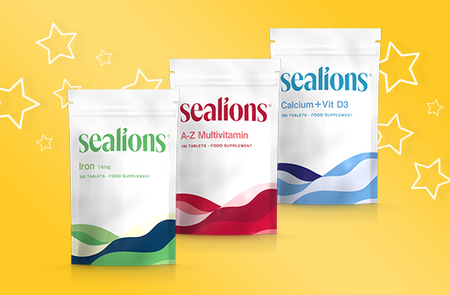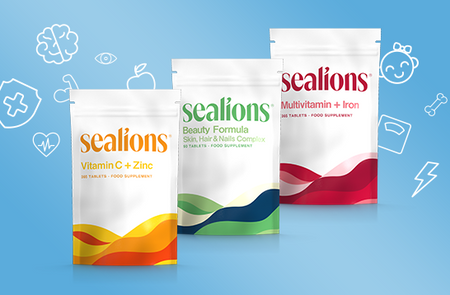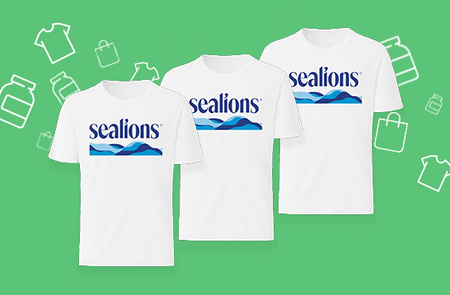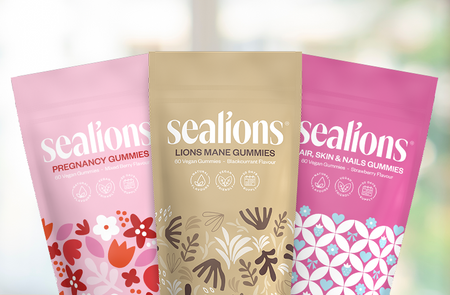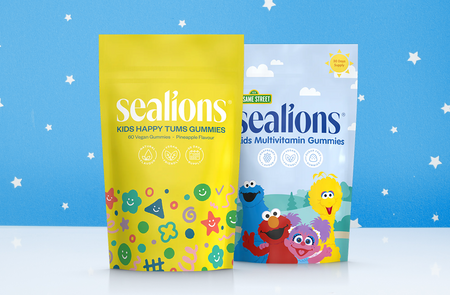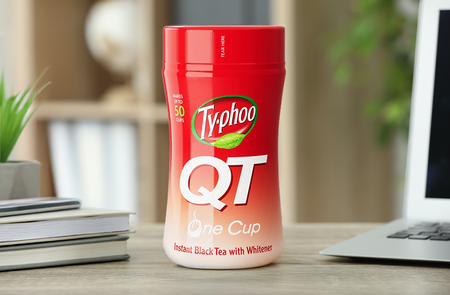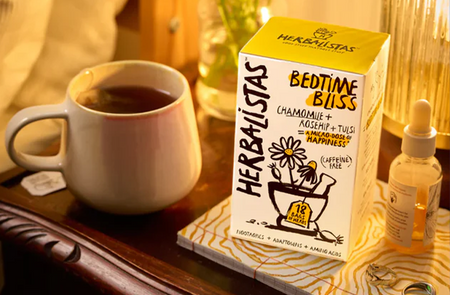Vitamin and mineral supplements for men and women over 50
As we enter our 50s, our bodies have to deal with a lot of changes. We're no longer able to bounce back from illness or injury as quickly as we used to, and it takes just one wrong move at the gym for us to feel it the next morning.
Our metabolism has slowed down as well, and we're not burning as many calories as we did in our younger days. But don't worry, with Sealions range of essential vitamins and minerals for over 50s, you can start feeling better than ever.
Why you need different vitamins and minerals when you're over 50
As you grow older, your body becomes less efficient at absorbing and using nutrients. Your metabolism slows down, causing a higher percentage of your food to be stored as fat. Your bones become less dense, increasing the likelihood of falls and fractures. Your immune system weakens, which makes it harder for your body to fight off infection and disease.
In short: a lot changes when you hit 50! So, if you want to stay strong and healthy as you age, and avoid common conditions like osteoporosis and Alzheimer's disease, you need regular doses of essential vitamins, minerals and other nutrients in order to keep your changing body in tip top condition.
Digestion support for older people
If you've hit your 50s and started to notice that your digestive system isn't moving as smoothly as it used to, you're not alone.
Digestive issues are common among older people, resulting in gas and bloating, constipation or diarrhoea (or both), acid reflux, heartburn, nausea and more. At Sealions, we have a range of digestion supplements to support your system.
Women going through the menopause need different vitamins and minerals than younger adults. This is because their bodies are undergoing various hormonal changes.
A drop in oestrogen and progesterone levels, for example, can impact heart health. It can also cause bones to lose density, making them more prone to fractures.
As you age, your body gradually loses the ability to produce collagen and other compounds that support healthy bones. This can leave you at risk of osteoporosis, a condition that causes weakened bones and an increased risk of fractures.
It's not just women who suffer with weak bones. Both men and women can find their bones become more brittle with age, which can lead to a greater risk of developing osteoporosis or bone fractures.
And it's not just the joints themselves that are affected by aging - it's also the surrounding tissue and muscles.
A bone and joint support supplement, such as Glucosamine Sulphate supplements, can help prevent osteoporosis and promote strong, healthy bones by increasing your skeletal system's absorption of calcium and other minerals.
Essential vitamins and minerals for over 50s
If you're over 50, in addition to physical activity and nutrition, there are several vitamins and minerals that are essential to help improve your overall health and well-being, these are some of the best:
Vitamin A
Vitamin A is an essential nutrient for healthy skin, eyes, teeth and gums. It's also important for the immune system and cell growth.
Some of the benefits of taking vitamin A for over 50s include:
- Reduced risk of age-related macular degeneration (AMD): AMD is a leading cause of blindness in people over 50. Taking vitamin A supplements may help to reduce the risk of developing AMD.
- Reduced risk of osteoporosis: Osteoporosis is a condition that causes bones to become weak and brittle. Taking vitamin A supplements may help to reduce the risk of osteoporosis by strengthening bones.
- Improved immune function: The immune system weakens as people age. Taking vitamin A supplements may help to improve immune function and help to fight off infection.
- Reduced risk of cancer: Some studies have shown that taking vitamin A supplements may help to reduce the risk of certain types of cancer, such as lung cancer and prostate cancer.
The recommended daily allowance of vitamin A for adults aged 51 and over is 900 micrograms (mcg) retinol activity equivalents (RAE) for men, and 700 mcg RAE for women.
Vitamin B6
Vitamin B6 is a water-soluble vitamin that's needed for hormone production and the production of red blood cells. It also helps the body to make neurotransmitters, like serotonin and melatonin, which are chemicals that affect your mood.
Vitamin B6 can help with symptoms associated with the menopause, restless leg syndrome and fibromyalgia - conditions that are more common in women over 50.
Other benefits of taking vitamin B6 for over 50s include:
- Reduced risk of heart disease: Some studies have shown that taking vitamin B6 supplements may help to reduce the risk of heart disease by lowering homocysteine levels.
- Reduced risk of dementia: Some studies have shown that taking vitamin B6 supplements may help to reduce the risk of dementia, a condition that causes memory loss and other cognitive problems.
- Improved mood: Vitamin B6 may help to improve mood and reduce symptoms of depression, which are more common in people over 50.
- Improved sleep quality: Vitamin B6 may help to improve sleep quality, which is often disrupted in people over 50.
The recommended daily allowance of vitamin B6 for adults aged 51 and over is 1.5 milligrams (mg)
Vitamin B12
Vitamin B12 is a water-soluble vitamin that's important for the production of red blood cells and DNA. It's also essential for the nervous system, as well as for maintaining healthy skin, hair and nails and helping to fight feelings of tiredness and fatigue.
As people age, they may become more likely to develop a vitamin B12 deficiency. This is because the body's ability to absorb vitamin B12 from food declines with age. Vitamin B12 deficiency can cause anaemia and problems with balance or walking.
Additionally, some people over 50 may have certain health conditions that make them more likely to develop a vitamin B12 deficiency, such as:
- Atrophic gastritis: This is a condition that causes the stomach to produce less acid, which is needed to absorb vitamin B12 from food.
- Pernicious anemia: This is an autoimmune disorder that damages the cells in the stomach that produce intrinsic factor, a protein that is needed to absorb vitamin B12 from food.
- Vegetarian or vegan diet: People who follow a vegetarian or vegan diet may be at increased risk of developing a vitamin B12 deficiency because they do not consume animal products, which are the main sources of vitamin B12 in the diet.
Some of the benefits of taking vitamin B12 for over 50s include:
- Reduced risk of anaemia: Vitamin B12 deficiency is a leading cause of anaemia in older adults. Taking vitamin B12 supplements can help to prevent or treat anaemia.
- Improved cognitive function: Vitamin B12 deficiency has been linked to impaired cognitive function, such as memory loss and dementia. Taking vitamin B12 supplements may help to improve cognitive function in people with vitamin B12 deficiency.
- Reduced risk of heart disease: Vitamin B12 deficiency has been linked to an increased risk of heart disease. Taking vitamin B12 supplements may help to reduce the risk of heart disease in people with vitamin B12 deficiency.
The recommended daily allowance of vitamin B12 for adults aged 51 and over is 2.4 micrograms (mcg).
Vitamin C
Vitamin C is another essential vitamin for men and women over 50. It's an antioxidant that helps to reduce the effects of free radicals, which can damage cells and cause them to age prematurely. Vitamin C also promotes wound healing and helps with immune system function as well as blood clotting.
Some of the benefits of taking vitamin C for over 50s include:
- Reduced risk of infection: Vitamin C helps to keep the immune system strong and helps to fight off infection. This is especially important for older adults, who are more likely to get sick.
- Improved skin health: Vitamin C is essential for the production of collagen, a protein that gives skin its strength and structure. As people age, their skin produces less collagen, which can lead to wrinkles and other signs of aging. Taking vitamin C supplements may help to improve skin health and reduce the appearance of wrinkles.
- Reduced risk of heart disease: Vitamin C may help to reduce the risk of heart disease by lowering cholesterol levels and reducing inflammation.
- Cancer prevention: Some studies have shown that vitamin C may help to reduce the risk of certain types of cancer, such as lung cancer and stomach cancer.
For adults age 50 and older, the recommended dietary intake of vitamin C is 90 mg / day for men and 75 mg / day for women.
Vitamin D
Vitamin D plays an important role in bone health and calcium absorption. Without enough vitamin D, bones can become brittle and weak. As we age, our bodies become less efficient at absorbing calcium which means we need more now than ever to ensure that bones remain strong.
While vitamin D is important for bone health, it is also essential for immune system function and muscle strength, as well as to regulate the amount of calcium and phosphate in the blood.
Vitamin D isn't made by the body. So it must be obtained through diet or supplements.
Some of the benefits of taking vitamin D for over 50s include:
- Reduced risk of fractures: Vitamin D helps the body to absorb calcium and phosphorus, which are essential for building and maintaining strong bones. This may help to reduce the risk of fractures, which are more common in older adults.
- Improved muscle function: Vitamin D helps to keep muscles strong and healthy. This may be especially important for older adults, who are more likely to experience muscle weakness.
- Reduced risk of heart disease: Vitamin D may help to reduce the risk of heart disease by lowering cholesterol levels and reducing inflammation.
- Cancer prevention: Some studies have shown that vitamin D may help to reduce the risk of certain types of cancer, such as colon cancer and breast cancer.
The recommended daily intake of vitamin D for adults over 50 is 15 micrograms (mcg) or 600 international units (IU). However, some people may need more vitamin D, especially if they have a deficiency.
Vitamin E
Vitamin E is a fat-soluble vitamin and is important for healthy skin and hair. In fact, vitamin E deficiency can lead to dry skin or brittle nails and hair loss.
Some of the potential benefits of taking vitamin E for over 50s include:
- Reduced risk of heart disease. Studies have shown that people who get enough vitamin E have a lower risk of developing heart disease. This is thought to be due to vitamin E's ability to protect LDL (bad) cholesterol from oxidation, which can lead to the formation of plaque in the arteries.
- Reduced risk of cancer. Some studies have shown that people who get enough vitamin E have a lower risk of developing certain types of cancer, such as prostate cancer and lung cancer. However, more research is needed to confirm these findings.
- Reduced risk of cognitive decline. As people age, they are more likely to experience cognitive decline, such as memory loss and difficulty thinking. Vitamin E may help protect against cognitive decline by reducing oxidative stress in the brain.
- Improved immune function. As people age, their immune system becomes less effective. Vitamin E may help improve immune function by boosting the production of white blood cells.
- Reduced risk of age-related macular degeneration (AMD). AMD is a leading cause of blindness in people over 50. Studies have shown that people who get enough vitamin E have a lower risk of developing AMD.
The recommended daily intake of vitamin E for adults over 50 is 15 milligrams (mg). However, some people may need more vitamin E, such as those who have certain health conditions or who are taking certain medications.
Calcium
As you age, your body needs more calcium to stay healthy. Calcium is important for bone health, as well as muscle function, blood clotting and nerve function. It also plays an essential role in the heart's ability to beat properly.
Calcium deficiency can lead to osteoporosis - a condition that causes bones to become brittle and break easily.
There are a number of potential benefits of taking calcium supplements for over 50s, including:
- Reduced risk of osteoporosis. Calcium supplements can help to slow the rate of bone loss and reduce the risk of fractures in people with osteoporosis.
- Improved muscle function. Calcium is important for muscle contraction and relaxation. As people age, they may experience muscle weakness, which can make it difficult to perform everyday activities. Calcium supplements may help to improve muscle function and reduce the risk of falls.
- Reduced risk of high blood pressure. Some studies have shown that calcium supplements may help to lower blood pressure in people with high blood pressure.
- Reduced risk of colon cancer. Some studies have shown that calcium supplements may help to reduce the risk of colon cancer.
For adults over 50, the recommended daily intake of calcium is 1,200 milligrams (mg).
Magnesium
If you're a woman over 50 and looking to improve your health and mental well-being, then magnesium should be high on your list of supplements to take.
Magnesium is an essential mineral that helps with sleep, energy, and muscle tension, as well as fatigue and anxiety. Magnesium also helps regulate blood pressure levels, which is important for maintaining healthy cardiovascular function.
Some other potential benefits of taking magnesium for over 50s:
- Reduced risk of heart disease. Magnesium helps to regulate blood pressure and blood sugar levels, both of which are risk factors for heart disease. Studies have shown that people who get enough magnesium have a lower risk of developing heart disease.
- Reduced risk of stroke. Magnesium helps to keep blood vessels healthy and prevents blood clots, both of which are risk factors for stroke. Studies have shown that people who get enough magnesium have a lower risk of developing stroke.
- Reduced risk of type 2 diabetes. Magnesium helps to regulate blood sugar levels, which is important for people with type 2 diabetes. Studies have shown that people who get enough magnesium have a lower risk of developing type 2 diabetes.
- Improved sleep. Magnesium helps to relax muscles and promote sleep. Studies have shown that people who take magnesium supplements may have better sleep quality.
- Reduced anxiety and depression. Magnesium helps to regulate mood and reduce stress levels. Studies have shown that people who take magnesium supplements may have less anxiety and depression.
- Improved bone health. Magnesium is important for bone health and helps to prevent osteoporosis. Studies have shown that people who get enough magnesium have stronger bones.
The recommended daily intake of magnesium for adults over 50 is 420 milligrams (mg) for men and 320 mg for women.
Potassium
Potassium is a crucial mineral that helps regulate several bodily functions, including heart health and bone health. It's also important for keeping your blood pressure healthy, and preventing muscle cramps.
Potential benefits of taking potassium for over 50s include:
- Reduced risk of high blood pressure. Potassium helps to lower blood pressure, which is a major risk factor for heart disease, stroke, and kidney disease.
- Reduced risk of stroke. Potassium helps to keep blood vessels healthy and can help to prevent blood clots, both of which are risk factors for stroke.
- Reduced risk of kidney stones. Potassium helps to prevent the formation of kidney stones.
- Improved muscle function. Potassium helps to keep muscles strong and can help to prevent muscle cramps.
- Reduced risk of osteoporosis. Potassium helps to keep bones strong and can help to prevent osteoporosis.
The recommended daily intake of potassium for adults over 50 is 4,700 milligrams (mg) for men and 3,500 mg for women.
Omega-3 Fatty Acids
Omega-3 fatty acids have a number of health benefits, including:
- Reduced risk of heart disease. Omega-3 fatty acids help to reduce inflammation, which is a major risk factor for heart disease. They also help to lower blood pressure and triglyceride levels.
- Reduced risk of stroke. Omega-3 fatty acids help to keep blood vessels healthy and can help to prevent blood clots, both of which are risk factors for stroke.
- Reduced risk of Alzheimer's disease and dementia. Omega-3 fatty acids are important for brain health and may help to protect against Alzheimer's disease and dementia.
- Reduced risk of depression. Omega-3 fatty acids help to regulate mood and may help to reduce depression.
- Reduced risk of rheumatoid arthritis. Omega-3 fatty acids help to reduce inflammation, which is a major symptom of rheumatoid arthritis.
- Reduced risk of dry eye syndrome. Omega-3 fatty acids are important for eye health and may help to reduce dry eye syndrome.
- Improved joint health. Omega-3 fatty acids help to reduce inflammation and pain, which can be beneficial for people with joint conditions such as arthritis.
- Improved cognitive function. Omega-3 fatty acids are important for brain health and may help to improve cognitive function in older adults.
As people age, their need for omega-3 fatty acids may increase. This is because omega-3 fatty acids play an important role in maintaining brain, heart, and joint health. Adults over 50 should aim to get at least 2 grams of omega-3 fatty acids per day.
To get enough omega-3 in your diet, supplement with omega-3 fish oil capsules.
The right nutrients can make all the difference as you age
While there are no magic anti-aging pills, there are certain vitamins and supplements that can help support your body through the natural aging process.
By making sure you get the right nutrients into your body, you can keep your health in check as you enter the next phase of life. And since all of us age at our own pace, it's important to tailor your supplement regimen to meet your specific needs.
A good place to start is with:
- A Multivitamin Tablets for Over 50s that contains the essential vitamins and minerals listed above
- Prefer your multivitamins in a gummy? Try our Adults Multivitamin Gummies for complete daily support
- And for overall health, include a vegan friendly supplement, formulated specifically with green tea extract
The right nutrients can make all the difference as you age
While there are no magic anti-aging pills, there are certain vitamins and supplements that can help support your body through the natural aging process.By making sure you get the right nutrients into your body, you can keep your health in check as you enter the next phase of life. And since all of us age at our own pace, it's important to tailor your supplement regimen to meet your specific needs.
A good place to start is with:
- A Multivitamin Tablets for Over 50s that contains the essential vitamins and minerals listed above
- Prefer your multivitamins in a gummy? Try our Adults Multivitamin Gummies for complete daily support
- And for overall health, include a vegan friendly supplement, formulated specifically with green tea extract
What are the potential side effects of vitamin supplements?
It is important to note that not everyone who takes vitamin supplements will experience side effects. The risk of side effects is increased if you take high doses of supplements, or if you take supplements that contain multiple vitamins and minerals.
It is also important to talk to your doctor before taking vitamin supplements, especially if you have any health conditions.
- Nausea, vomiting, and stomach upset. These are some of the most common side effects of vitamin supplements, especially those that are high in fat-soluble vitamins (A, D, E, and K).
- Diarrhoea. This can be a side effect of taking high doses of vitamin C, magnesium, or iron.
- Headaches. This can be a side effect of taking high doses of vitamin B6 or B12.
- Skin problems. This can be a side effect of taking high doses of vitamin A, niacin, or zinc.
- Allergic reactions. These can occur in people who are allergic to certain vitamins or minerals. Symptoms can include hives, rash, itching, and swelling.
- Serious side effects. In rare cases, vitamin supplements can cause serious side effects, such as liver damage, kidney damage, and heart problems.
Here are some tips for reducing the risk of side effects from vitamin supplements:
- Take the recommended dose. Do not take more than the recommended dose of any vitamin supplement.
- Take supplements with food. This can help to reduce stomach upset.
- Space out your doses. If you are taking multiple vitamin supplements, take them at different times of day.
- Talk to your doctor. If you have any health conditions, talk to your doctor before taking vitamin supplements.
It is also important to remember that vitamin supplements should not be used as a substitute for a healthy diet. A balanced diet is the best way to get the nutrients your body needs.
Shop Sealions for vitamins and minerals for over 50s
We believe high-quality vitamin supplements shouldn't cost the earth. Which is why our vitamins start at just £5 for a year's supply. You can support your health without worrying about the cost.
Even better, all of our supplements are packaged in compostable or recyclable packaging, meaning you can afford supplements without the impact of single-use plastic on the earth. For more advice and support about which supplements are best for you, please contact our friendly team today.

